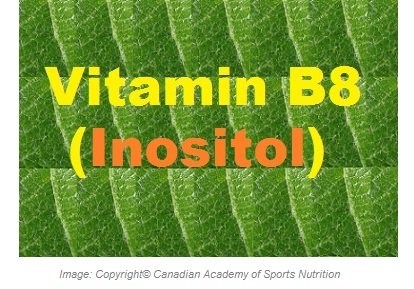 sometimes called “vitamin Bm”, as it is actually myo – inositol. Acting as a lipotropic agent, inositol accelerates the breakdown of fats, prevents abnormal or excessive accumulation of fat, and increases their utilization by the body. It also helps with the metabolism of fatty acids and carbohydrates.
sometimes called “vitamin Bm”, as it is actually myo – inositol. Acting as a lipotropic agent, inositol accelerates the breakdown of fats, prevents abnormal or excessive accumulation of fat, and increases their utilization by the body. It also helps with the metabolism of fatty acids and carbohydrates.
Functions of Inositol:
- It is required for the integrity of the cell membrane.
- It assists with the metabolism of fatty acids and carbohydrates.
- It may help with the conduction of nerve signals.
- It has a lipotropic activity.
- It may control calcium concentration within the cells.
- It is necessary for optimal function of insulin.
Food Sources and Absorption:
Inositol is a part of phospholipid and phytic acid, which are found in animal sources and plant sources, respectively. Food sources of inositol include brewer`s yeast, liver, whole grains, cantaloupe, citrus fruits (except lemon), bananas, wheat germ, nuts, beans, raisins, cabbage, and lecithin. Also the body can produce inositol from glucose by intestinal bacteria.
Inositol is primarily absorbed from the small intestine and distributed in all body tissues, with the highest concentrations in the brain, heart, and lens of the eyes. After vitamin B3, inositol has the second highest store in the body. Caffeine depletes the inositol stores in the body, leading to potential inositol deficiency.
Benefits of Inositol:
The following conditions may benefit from inositol:
- Anxiety.
- Depression.
- Bipolar disorder.
- Panic disorder.
- Premature ejaculation.
- Obsessive – compulsive disorder (OCD).
- Bulimia.
- Diabetes.
- Fatty liver.
- Multiple sclerosis.
- Diabetic neuropathy.
- Polycystic ovarian syndrome (PCOS).
- High cholesterol.
- Hair loss.
- Dermatitis.
- Eczema.
- Intermittent claudication.
- Raynaud`s disease.
- Restless leg syndrome.
- Metabolic syndrome.
- Weight management.
Dosage and Side Effects:
No RDA has been established for inositol. It is added in small amounts to many multivitamin products. The usual suggested dose is 1000 – 4000 mg a day. However, for psychiatric disorders such as anxiety, depression, and obsessive – compulsive disorder, more than 10 grams a day might be needed.
Although inositol is considered safe, larger amounts could cause stomach upset, nausea, and belches.
Interactions:
- Lithium: inositol may increase the effectiveness of this medication.
- Inositol nicotinate breaks down into niacin in the body. Therefore, inositol products increase blood levels of niacin. For more information about niacin, see “Niacin (vitamin B3)” under the section of “GH Enhancers”.

